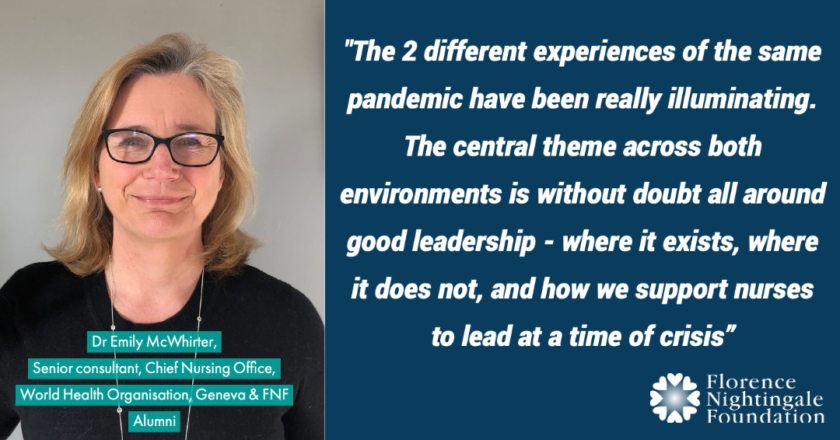
Dr Emily McWhirter is a motivated and dedicated senior healthcare practitioner, change consultant, manager, leader and nurse, with a PhD in nursing, and strategic healthcare management education at Harvard Business School. She has worked in the National Health Service and the independent and charity sector for over 30 years, 20 at a senior level, across 4 London teaching hospitals, specialist centres and district general hospitals. Key to her success as a strategic leader is the ability to build strong and motivated teams, driven by my unwavering commitment to achieving exceptionally high standards and the relentless pursuit of higher quality and safe healthcare.
Having been a Director of Nursing for three and a half years, which included leading a hospital through the Covid-19 pandemic, Emily is now working on projects with the World Health Organisation to support the development of nurses to become agile, flexible and compassionate leaders.
Here is her own journey and the radical changes she has had to make in the last year.
The Journey
There was no great ‘plan’ to my journey through nursing. I knew I would be a nurse from very early on, and when I left school, I was thought I was actually going to be a Midwife. I have had a quite a few jobs in my career, but each time I move onto a new role or specialty, I use what I have learnt previously, to help me in the next one. The skills you learn as a nurse are so transferable, it makes it easier to move from one specialty to another.
I worked in a HIV Unit in London in the early 1990’s. I learnt skills about life, death and dying that I have used in every role I have had since – and, nearly 30 years on, has become especially relevant when I was running the Covid-19 operation during the first wave as a Director of Nursing. These experiences of working in an infectious diseases environment really helped me support staff who were anxious about caring for patients with Covid-19.
Education, Education, Education
A really important part of my journey has been my access to learning. I am a huge advocate for post graduate education, and The Florence Nightingale Foundation supported me with my PhD studies at the time, and although achieving this was one of the hardest things I have done, taking me almost 7 years, it has helped me understand data, strategy and leadership in great detail – skills that have been invaluable in all my senior roles.
Five years ago, I was fortunate to spend some time at Harvard Business School and study healthcare management. I learnt about healthcare systems from experts all over the world, which was a game changer for me. We have so much to learn from colleagues who live and work in cultures and societies that are different from ours in the UK and right now, more than ever, we need to share what we know and work together.
Radical change
In early 2017, I became the Director of Nursing at the Royal Hospital for Neuro-disability in London and was also the Director for Infection Prevention and Control. Then at the start of the current pandemic in March 2020, I activated an early lockdown to keep our patients safe and led the operational response for the next 126 days. This was a really tough and frightening time for our hospital community. Many staff and patients were very unwell. One of our challenges was acquiring sufficient PPE and in December 2020 I gave evidence to the Public Accounts Committee representing the RCN about the government’s response to the PPE crisis.
In October 2020 I started working for the Chief Nurse at the World Health Organisation, where I worked through the second wave of the pandemic in an entirely different role and saw it from a completely unique and global perspective.
The 2 different experiences of the same pandemic have been really illuminating. The central theme across both environments is without doubt all around good leadership – where it exists, where to does not, and how we support nurses to lead at a time of crisis.
Family and nursing support
A common thread throughout all my different roles has focused on support and care of families. There is nothing more frightening than having a loved one who is seriously ill, however throughout all the nursing jobs I have done, it’s the family support that has been a priority. Having to stop them visiting their loved ones in hospital at the start of the pandemic last year was really difficult, but I am particularly proud of the way nurses have found creative ways to connect patients and family together during this pandemic.
Let’s work together!
One thing I have really come to understand is the need to look outwards and seek help, guidance, and advice. Countries that have done this, have managed well. Hospitals that did this, have managed well. Those that did not, became isolated and made bad decisions. We are so much stronger when we work together!
Finally, as part of the alumni, I am able to contribute to FNF’s work by being a mentor to scholars undertaking their leadership programmes. Being part of a network means we stay connected and support each other.